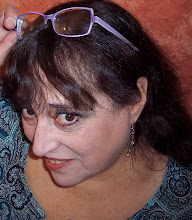Read only if you're curious about sad computer-experience stories, or if you're a masachist.
Sorry that there haven't been any new blogs from me for the past few weeks: I've been in cyber-hell. My trusty old computer had been slowing down, groaning, and begging for relief by spitting surfed pages back out for a while now. Finally, I gave in, did a little research, asked my good friend and computer guru Jamie as well as my brother for help. My brother, who's really good at computers, recommended a few refurbished Dells. So...I bought one. There it was, all bright and shiny---the very next day! It took a while, and Jamie's help and encouragement, but I finally got the Dell up and running. And it was wonderful!
For five days.
And then the refurbished Dell started to make whirring noises, wouldn't read my Trackball mouse anymore, required extensive prayers, stopped paying attention to my Preferences in a couple of programs, and began to kick me out of Firefox. A wonderful phone-tech in Myanmar or India or a hilltop in Tibet or somewhere, named Sam, tried to help. (Dell really does have good customer support, so someday I might buy a NEW Dell product.)
But when she got to...let's Reinstall Windows, I said...”Nope, that Window is closed.” After a very very long, discouraging wait, Dell agreed to take the computer (and screen) back. Whew! I had about 5 days left on the return policy before I would have to continue accepting Fixes to it. Glad I read the fine print.
The moral of the story: Refurbished is good if you really know what you're doing. If you don't, and have mini-cardiac-arrests every time the computer burps, like I do, don't get one.
During this time, my old computer decided to die. (I'd moved it to the basement, and I suppose it got lonely.) I have, I am very proud to say, reinstalled Windows (don't tell Dell) in that one, resurrecting it---and it works, though it has no memory at all of what has gone before. Luckily, I'd taken as much as I could out of it and copied it onto handy, dandy thumb drives to transfer to the new machine(s) before unplugging it upstairs.
So then it was about buying a brand new computer. The one I wanted was through Best Buy (which has awful customer support---and they only had it in Mt. Juliet---about 45 minutes away and a highway drive I hate. Off I went. The salesperson sold me the model below it, for $100 less. The next day I called and said, “what did he do? I want the other machine.” So I went back to Mt. Juliet, box unopened, because Best Buy refused to ship the computer I really wanted to the West Nashville store. Then the salesman convinced me to buy the Microsoft Office for Students, because I wanted to be able to use Word (Oh, yeah, this machine is Vista instead of Dell's XP Pro---I'd been on XP on the old machine). Well, whaddaya know---Student has a very weird, unwieldy version of Word that is not worth anything---so I wasted yet more money.
A friend showed me how to get Open Office (just search for it---it's free), which has my old Word (or something similar enough). I love it.
All the info and programs I'd hand typed, downloaded, and updated the week before into the Dell had to be done again. I'm still doing it.
Another lesson---though I really enjoyed using aol for all these years---aol runs behind things in your computer, slows things down, and just messes some things up. Getting out of ao-hell is nearly impossible. I had to copy and paste literally hundreds (16 pages) of “favorites” into a Word document and it's taking me four days to copy and paste urls into Foxfire bookmarks.
Luckily my friend Mia showed me evernote, and I'm entering the list there at the same time. So I have my “filing cabinet” of websites on Foxfire (my computer), and evernote (off my computer in cyberspace somewhere).
I've purchased a VISTA for Dummies book (which is a bit advanced for my cyber-challenged brain). I'm determined to learn the workings of this machine.
I have been learning about computers through this whole process, and when the salesperson at Staples (bought a screen on a great sales!) spoke cyber-ese, I actually understood most of what he said. Shocked myself.
And, I'll be blogging again...maybe later today.



